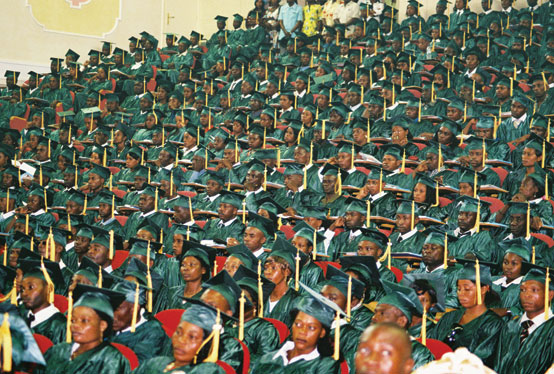Building a Better Future through Improved Teaching in Equatorial Guinea
| Global Learning | |

Thanks to the relatively recent discovery of major oil reserves, the economy of Equatorial Guinea, a historically poor country in West Africa, has surged over the past decade. AED is working with individuals at all levels of the education ministry to ensure that the nation’s education system—and specifically its teacher corps and primary schools—can surge along with it.
With a total population of close to one million, Equatorial Guinea is already seeing a demand for more skilled workers as oil development and other economic opportunities take hold. Government officials recognize that improving the nation’s schools is essential so that the country has home-grown talent to fill the emerging jobs, explained Sergio Ramírez, a senior project director for the AED Global Education Center, which is directing the program.
The Program for Education Development of Equatorial Guinea, or PRODEGE as it is known in Spanish, grew out of an agreement between the country’s president, H.E. Obiang Nguema Mbasogo, and Mr. John Hess, CEO of Hess Corporation, an energy company that has done business in the country for more than a decade.
Through this public-private partnership, AED was contracted to work with the nation’s Ministry of Education, Science and Sports to assess the needs of the country’s schools, develop a plan for raising their quality, and administer the program over a period of five years.
Government officials saw a clear need to improve education at all levels. Only one out of every six children who enter the nation’s primary schools completes the six years of studies, according to Ministry data produced with AED’s assistance. Roughly half of the nation’s primary school students are too old for their grade. The odds of girls receiving a quality education are especially poor: just one of every three high school graduates is female.
Creating Active Schools
AED is supporting the government’s commitment to transform the country’s entire education system, and improving the quality of teaching and learning in primary education in particular. Many teachers in Equatorial Guinea’s approximately 800 primary schools were volunteers or, if they were paid, had little if any training. A major component of PRODEGE is to enhance teachers’ classroom skills.
Since PRODEGE began in 2006, AED has overseen the training of 38 master teachers, who in turn are helping to boost the skills of hundreds of educators across the country. In April, 992 primary school teachers graduated from a two-year, AED-led teaching certification program in which
Peru
MARIA VICTORIA PASCUAL is the chief of party for the Comun@s project.
Comun@s is an effort to improve municipal government transparency across Peru through easy-to-use, publicly accessible information and communication technology. Project teams go out to the municipalities and install the computer modules, but this is not just a program to provide free computers. We also provide training for the citizens and local authorities, and for the civil servants who work in the municipalities because access to information is not just a right, it’s the law.
Each mayor is responsible for explaining what the project is about, and we support the mayors with that. Comun@s really counts on the mayors’ support and goodwill. Without it, the trainings wouldn’t be possible.
The most popular page for citizens using the computer modules is transactions—how to a get a driver’s license, a national identification card, a marriage certificate. The information is both written and oral and is available in Spanish, Quechua, and Ashaninka.
We will add voting information, including profiles of all the candidates running at the municipal, regional, and national levels. Soon, communities will be able to use the module to view live electoral events such as debates and information sessions. Through this project, people can actually approach, become involved in, and feel empowered to take part in their government. They become a part of the future of their community.
they learned pedagogical skills; how to make lessons engaging and less reliant on rote memorization; how to manage multi-grade classrooms, and content knowledge in communication, math, and other subjects.
AED is following a model for school improvement known as “active schools,” an approach originally pioneered in Latin America. It encourages the development of leadership skills in students through their role in their own education, through projects in the community, and through student governments in each grade, which model participatory civic and democratic behavior in the classroom.
‘A National Footprint’
In addition to training teachers, AED is providing ongoing support to 40 primary schools, with a combined 3,200 students, which serve as models for effective learning and improved academic performance. Those institutions are also being equipped with school supplies, classroom materials, and furniture. AED developed 1st grade teacher materials that emphasize reading and math skills, and learning guides for 2nd and 3rd grade students. Materials for 4th through 6th grade will be ready for the next school year.
“The country’s school-improvement effort should go beyond a small cluster of schools,” Ramírez said. “That’s why PRODEGE has a national footprint and has the opportunity to become a permanent reform.” AED, which employs about 70 national staff members on the program, has also strengthened the capacity of the education ministry to serve the country’s schools. AED helped the ministry establish a data-collection system to record information about schools, teachers, and students. This information helps the government in a number of ways, such as setting priorities in teacher hiring.
The government now knows the teacher-to-student ratios of individual schools, and which schools have the greatest need.
“The program has catalyzed energy and built the capacity and hopes of hundreds, possibly thousands of Equatoguineans,” said Carmen Siri, PRODEGE program director. “What has been accomplished involves the effort of many educators and communities around the country who now trust AED can help in the process of improving their education system.”
For more information, contact Sergio Ramirez.
PRODEGE is a project in the AED Global Learning Group which works to improve access to quality education for all and extends learning opportunities through the effective use of technology in more than 30 developing countries.


